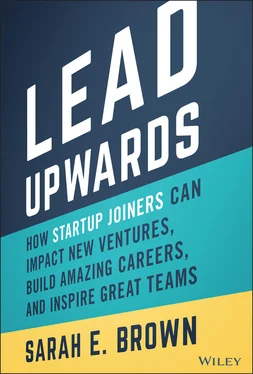171 180
172 181
173 182
174 183
175 184
176 185
177 186
178 187
179 188
180 189
181 191
182 192
183 193
184 194
185 195
186 197
187 198
188 199
189 200
190 201
191 202
192 203
193 205
194 206
195 207
196 208
197 209
198 210
199 211
200 213
201 214
202 215
203 216
204 217
205 218
206 219
207 220
208 221
209 222
210 223
211 224
212 225
213 226
214 227
215 228
216 229
217 230
218 231
219 232
220 233
221 234
222 235
223 236
224 237
225 238
226 239
227 240
228 241
229 242
230 243
231 245
232 246
233 247
234 248
235 249
236 250
237 251
238 252
239 253
240 254
241 255
242 256
243 257
244 258
245 259
246 260
247 261
248 262
249 263
250 264
251 265
252 267
253 268
254 269
255 270
256 271
257 272
258 273
259 274
260 275
261 276
262 277
263 279
264 287
265 288
266 289
267 291
268 292
269 293
270 294
271 295
272 296
273 297
274 298
275 299
276 300
277 301
278 302
279 303
280 304
281 305
SARAH E. BROWN
LEAD UPWARDS
HOW STARTUP JOINERS CAN IMPACT NEW VENTURES, BUILD AMAZING CAREERS, AND INSPIRE GREAT TEAMS

Copyright © 2022 by Sarah E. Brown. All rights reserved.
Published by John Wiley & Sons, Inc., Hoboken, New Jersey.
Published simultaneously in Canada.
No part of this publication may be reproduced, stored in a retrieval system, or transmitted in any form or by any means, electronic, mechanical, photocopying, recording, scanning, or otherwise, except as permitted under Section 107 or 108 of the 1976 United States Copyright Act, without either the prior written permission of the Publisher, or authorization through payment of the appropriate per‐copy fee to the Copyright Clearance Center, Inc., 222 Rosewood Drive, Danvers, MA 01923, (978) 750‐8400, fax (978) 750‐4470, or on the web at www.copyright.com. Requests to the Publisher for permission should be addressed to the Permissions Department, John Wiley & Sons, Inc., 111 River Street, Hoboken, NJ 07030, (201) 748‐6011, fax (201) 748‐6008, or online at http://www.wiley.com/go/permission.
Limit of Liability/Disclaimer of Warranty: While the publisher and author have used their best efforts in preparing this book, they make no representations or warranties with respect to the accuracy or completeness of the contents of this book and specifically disclaim any implied warranties of merchantability or fitness for a particular purpose. No warranty may be created or extended by sales representatives or written sales materials. The advice and strategies contained herein may not be suitable for your situation. You should consult with a professional where appropriate. Further, readers should be aware that websites listed in this work may have changed or disappeared between when this work was written and when it is read. Neither the publisher nor authors shall be liable for any loss of profit or any other commercial damages, including but not limited to special, incidental, consequential, or other damages.
For general information on our other products and services or for technical support, please contact our Customer Care Department within the United States at (800) 762‐2974, outside the United States at (317) 572‐3993 or fax (317) 572‐4002.
Wiley also publishes its books in a variety of electronic formats. Some content that appears in print may not be available in electronic formats. For more information about Wiley products, visit our web site at www.wiley.com.
Library of Congress Cataloging‐in‐Publication Data is Available:
ISBN 9781119833352 (Hardback)
ISBN 9781119833376 (ePDF)
ISBN 9781119833369 (ePub)
Cover Design: PAUL MCCARTHY
Dedicated to Erin Rand, Colleen Blake, and Matt Harada, whose tremendous leadership examples, support, and friendship have profoundly impacted my career trajectory. Also, in memory of my late grandmother Zelda Lipman, who taught me the power of lifelong learning and unconditionally believing in people, including oneself .
Introduction: Why Startup Leadership Matters at Every Level
So, why haven't you been an executive before? It looks like you were qualified years ago .
The venture capitalist's remarks were part of his due diligence in determining whether the early‐stage startup he invested in should hire me for a marketing leadership role. But upon hearing his backhanded compliment, my heart sank. While I was grateful for his affirmation that I was qualified to be considered for the position we were discussing, it made me wonder: why had I waited when my resume suggested I had enough experience for a startup executive position years earlier?
Fast forward several years later, and I'm a vice president of marketing at an early‐stage venture—a startup executive. That conversation with the VC was a wake‐up call, motivating me to learn how to transition from mid‐level manager to department leader, which I have done thanks in great part to the support of my executive coach, friends, my CEO, and peer network.
In hindsight, I didn't aspire to become a startup executive earlier in my career because I didn't know it was possible. I didn't understand what qualifications were required or which skill gaps I might need to address. I knew that there was a startup leadership tier I wasn't yet part of, but I didn't know how to reach it. I was also unable to picture myself as a startup executive, with so few role models in the industry who were like me, an openly LGBTQ+ woman. Lack of visibility does make a difference and can be a self‐perpetuating cycle.
Although we've seen progress in recent years, the technology industry is still overwhelmingly homogeneous at the leadership level. At the time of publishing, nearly half of all startups don't have a single woman on their executive teams. 1 A 2019 study from the National Center for Women and Information Technology (NCWIT) shows that while women are about 60 percent of the total workforce in the US, they are only 25 percent in the computer technology industry. 2
Within tech, people of color are fewer and egregiously rare in startup leadership. According to a study conducted by the Ascend Foundation, numbers of Black women in tech declined by 13 percent from 2003 to 2017. 3 According to Deloitte, approximately 2 percent of the tech workforce is Black, 3 percent is Latino or Latina. 4 Note: for a book specifically focused on the challenges women of color in tech face that includes fantastic resources; I highly recommend Susanne Tedrick's book Women of Color in Tech : A Blueprint for Inspiring and Mentoring the Next Generation of Technology Innovators .
The information technology industry is one of the crucial drivers of economic prosperity worldwide. It is a multi‐trillion dollar industry. 5 In 2021, the global cloud computing market alone was worth $270 billion. The tremendous wealth and opportunity in technology have been unevenly distributed. Inclusivity at all levels of startups drives economic equality.
Читать дальше











